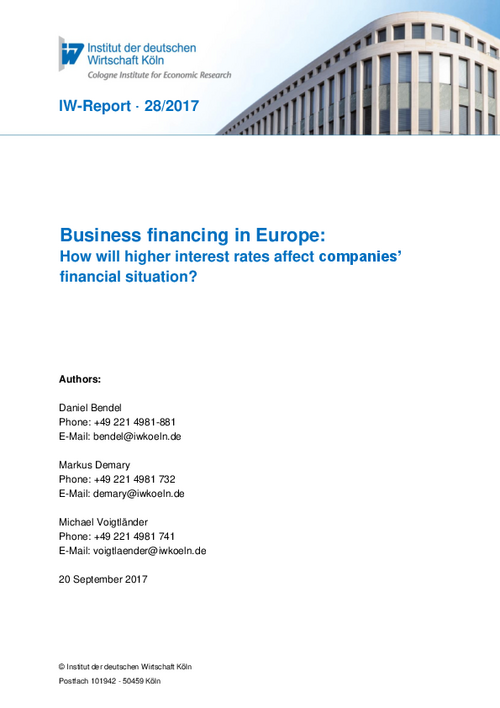Companies’ access to finance has an important impact on their profitability and growth prospects. Without external financing, most firms are not able to invest, which is a prerequisite for economic growth. Unlike in the US, which has a capital market-based financial system, banks are the dominant lenders for firms in the Eurozone.

Business financing in Europe: How do higher interest rates impact companies’ financial situation?
IW-Report

Companies’ access to finance has an important impact on their profitability and growth prospects. Without external financing, most firms are not able to invest, which is a prerequisite for economic growth. Unlike in the US, which has a capital market-based financial system, banks are the dominant lenders for firms in the Eurozone.
Banking crises endanger the access to finance. In the wake of the banking and sovereign debt crisis in the Eurozone risk premia for sovereign debt went up and spilled over to banking markets. Besides sovereigns, also firms faced credit constraints, especially in countries with presumably less sustainable public debt. After the ECB accelerated its accommodative monetary policy stance even further, interest rates for sovereigns and firms went down considerably, enabling firms to lend money at historically low charges. With the strengthened recovery of the Eurozone, the end of this ultra-low interest rate environment seems to be near, posing new challenges for firms in the Eurozone.
The aim of this study is to analyze, how firms have dealt with this changing financing environment in the recent years and to which degree companies are prepared for a change towards higher interest rates. For answering this research question we use data from the survey on the access to finance of enterprises (SAFE), provided by the ECB.
We identify companies that are vulnerable to increasing interest rates, as they will presumably encounter economic problems when financing costs will rise. The share of vulnerable companies is extremely high in Greece (9.4 percent), Italy (8.5 percent) and France (5.7 percent). The lowest rate can be found in Germany (0.7 percent). With respect to the size of the national business sectors, 39 percent of all vulnerable firms a located in Italy, 23 percent in France and 15 percent in Spain. Thus, these countries could be hit hard when the ECB starts to tighten monetary policy. As comparatively many large companies are prone to the risk of increasing interest rates in Portugal (4.0 percent of the large Portuguese companies) and Greece (10.0 percent of the large Greek companies), the labor markets of these countries could be affected disproportionally when interest rates increase to fast or too high.

Daniel Bendel / Markus Demary / Michael Voigtländer: Business financing in Europe – How do higher interest rates impact companies’ financial situation?
IW-Report

More on the topic
![[Translate to English:] Das Gebäude des Weißen Hauses in Washington, D.C. in den Vereinigten Staaten von Amerika. [Translate to English:] Das Gebäude des Weißen Hauses in Washington, D.C. in den Vereinigten Staaten von Amerika.](/fileadmin/_processed_/c/1/csm_GettyImages-2161499385_White_House_Editorial_884306add8.jpg)
Trump or Harris or ...? What Europe must prepare for
A few months before the presidential election in the USA, Donald Trump has a good chance of being re-elected. On the Democratic side, the incumbent president has withdrawn his candidacy after a long period of hesitation, while Vice President Kamala Harris is ...
IW
Compendium 5.5: CO2 Regulation of Road Transport in Europe
With the Compendium CO2 Regulation in Europe, the IW has been providing the interested public with a comprehensive collection of data on the development of CO2 emissions from passenger car traffic in the European Union, as well as on the applicable regulatory ...
IW